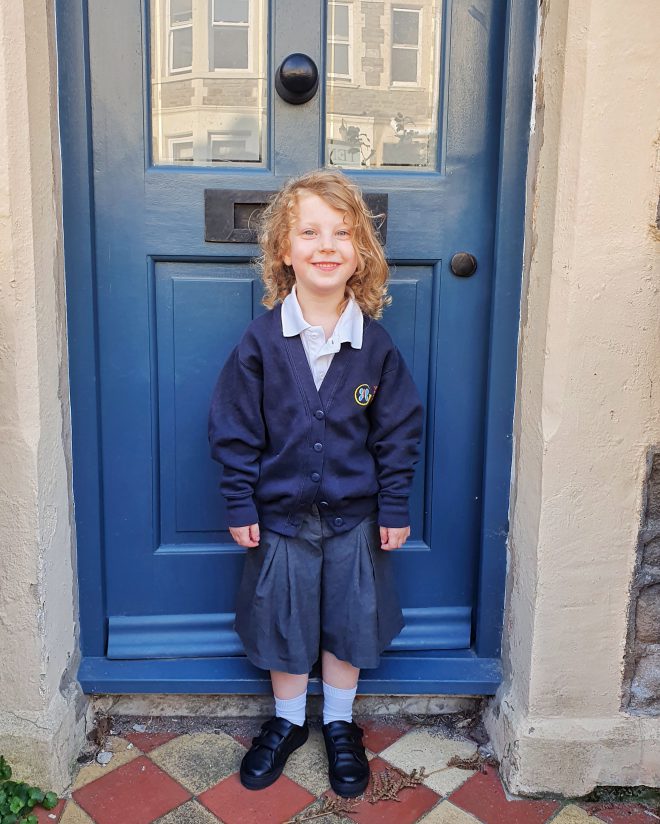If you’ve got a child starting school in September, now is a great time to start preparing them for school meals, especially if you’ve got a fussy or reluctant eater.
Children need to embrace a lot of change when they start school; a change of environment, routine, friendship groups, activities, carers, as well as food. All of this change can have an impact on how well they eat, even if they’re usually good eaters, so supporting your child now will help them once school starts.
Some of the things you can be doing now are:
Prepare foods in different ways
Start by simply preparing foods that they already eat in different ways, so they get used to the same foods looking and tasting different (they won’t make it like mummy does at school!).
Start by offering differently prepared foods alongside the familiar preparation so that they’re not as scary.
Lunch dates with friends and visiting family can be useful in supporting this learning.
Explore more new foods with them
Children need to repeatedly see, smell and touch a new food as well as see you eating and enjoying it before they’ll eat it. Offering foods over and over again, despite them not eating them, is supporting them to become familiar with the food and build up that comfort that they need to start exploring and ultimately tasting it.
Ask for a sample menu
Ask the school or look on the school website for a sample menu. You’ll then be able to talk to your child about the sorts of food to expect at school as well as being able to add any that are new to your meal plans so they can start to become familiar with them.
A strange environment
The environment in which our children eat can impact on how well they eat – they will likely not be used to a bustling large hall and all the noise, which can be disruptive for them and prevent them from eating well.
See if you can find pictures of school halls at lunchtimes so they can see how the room will look and become familiar with the environment.
Talk to them also about how the food is served and how different this is to home and their current childcare setting.
Egg and spoon races and practicing to carry trays are great ways to build up their confidence for the school hall.
Slow eater?
There will likely be time limits too for them to get used to as several classes and year groups need to use the same hall. If they’re a slow eater, you can support them to get used to this time limit by timing how long they normally take to eat and then putting a timer on for 5 minutes less. This is the time in which they have to eat the meal before it’s taken away. Gradually reduce the time by 5 minutes until you reach say 30 minutes.
Cutlery
Children are encouraged to be as independent as possible, including at lunchtime. Support them to be able to use their cutlery throughout a meal, including how to use a knife properly and safely. Practicing knife and fork skills with playdough can be a fun activity!
Packed lunch?
If you have a particularly fussy eater or a child with food sensory issues, it can reduce anxiety for your child if they have their familiar and safe foods some days as a packed lunch whilst pushing the boundaries a little on others.
As they become used to the change and can see the school meals on a daily basis, you may be able to decrease how often they take in a packed lunch.
Once your child starts school, don’t give up and resort to packed lunch too soon. It will take a while for them to get used to the change, new routine, strange eating environment, new people and different food.
Don’t let your concerns show
Your child may not be worried about school meals until they see you worrying about it. One of the best ways to support your child with any mealtime is to remain calm and relaxed – if you’re calm and relaxed, your child is more likely to be also and in a better mindset for exploring food.
Peer support
Many children eat better away from home and with their peers. Once over the initial distractions and the unfamiliar environment, children can eat better at school than at home because they can’t push boundaries the same as they can with you, their friends are eating the same foods, they are distracted by chat, fun and games and because their appetite is better at lunchtime than in the evening.
They won’t starve!
Remember that they aren’t going to starve if they don’t eat much lunch at school. There is usually a mid-morning and mid-afternoon snack to keep them going. Yes, they’ll be hungry (probably also hangry) when you go to collect them, but nothing a decent, sustaining snack after school won’t fix! Take a look at my sustaining and nutritious snack ideas here.
